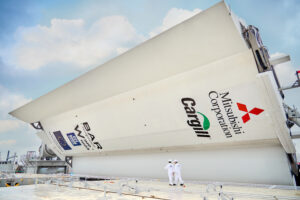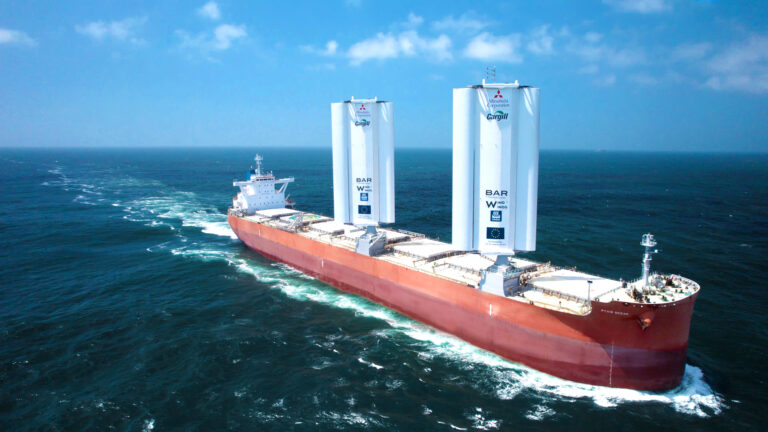Mitsubishi Corporation’s Pyxis Ocean cargo vessel has set sail on its maiden voyage powered by WindWings – a “ground-breaking” wind propulsion system.
Chartered by Cargill, the Pyxis Ocean has been retrofitted with two 37.5m-tall sails that harness wind power to fuel the vessel. The wings were developed by BAR Technologies and Yara Marine Technologies, with plans already in place to “build hundreds of wings over the next four years”.
Partly funded by the European Union’s Horizon 2020 initiative, the WindWinds project has seen the development of technology that is expected to “generate average fuel savings of up to 30% on new-build vessels, which could be even higher if used in combination with alternative fuels”.
John Cooper, Chief Executive of BAR Technologies, explained that each of the vessel’s WindWings is saving one and a half tonnes of fuel per day, equating to a daily saving of 4.65 tonnes of CO₂ emissions per wing.
He added: “If international shipping is to achieve its ambition of reducing CO₂ emissions, then innovation must come to the fore.
“Wind is a near marginal cost-free fuel and the opportunity for reducing emissions, alongside significant efficiency gains in vessel operating costs, is substantial.”

Jan Dieleman, President of Cargill Ocean Transportation, commented: “The maritime industry is on a journey to decarbonise – it’s not an easy one, but it is an exciting one.
“At Cargill we have a responsibility to pioneer decarbonising solutions across all our supply chains to meet our customer’s needs and the needs of the planet.
“A technology like WindWings doesn’t come without risk, and as an industry leader – in partnership with visionary shipowner Mitsubishi Corporation – we are not afraid to invest, take those risks and be transparent with our learnings to help our partners in maritime transition to a more sustainable future.”
Wind has been powering ships for millennia, but not like this. The success of technology such as this may well shape the future of ocean shipping. The Pyxis Ocean’s performance in the coming months will be “closely monitored”, with Cargill claiming that this data “will be used to inform the scale-up and adoption across not only Cargill’s fleet but the industry” as a whole.







